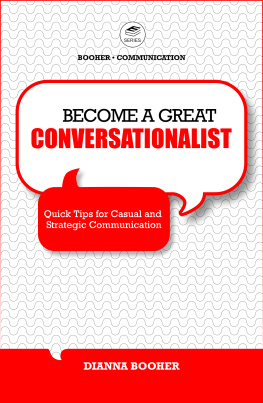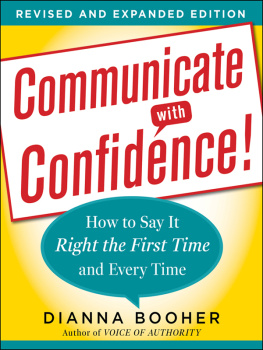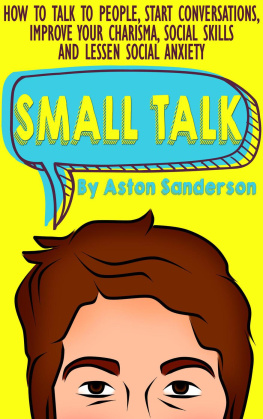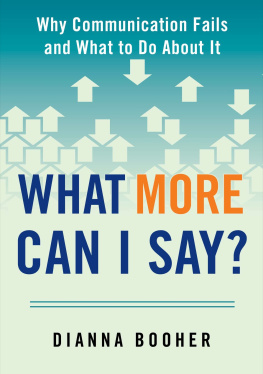Dianna Booher - Become a Great Conversationalist: Quick Tips for Casual and Strategic Communication
Here you can read online Dianna Booher - Become a Great Conversationalist: Quick Tips for Casual and Strategic Communication full text of the book (entire story) in english for free. Download pdf and epub, get meaning, cover and reviews about this ebook. year: 2012, publisher: Booher Research Institute, genre: Home and family. Description of the work, (preface) as well as reviews are available. Best literature library LitArk.com created for fans of good reading and offers a wide selection of genres:
Romance novel
Science fiction
Adventure
Detective
Science
History
Home and family
Prose
Art
Politics
Computer
Non-fiction
Religion
Business
Children
Humor
Choose a favorite category and find really read worthwhile books. Enjoy immersion in the world of imagination, feel the emotions of the characters or learn something new for yourself, make an fascinating discovery.
- Book:Become a Great Conversationalist: Quick Tips for Casual and Strategic Communication
- Author:
- Publisher:Booher Research Institute
- Genre:
- Year:2012
- Rating:5 / 5
- Favourites:Add to favourites
- Your mark:
Become a Great Conversationalist: Quick Tips for Casual and Strategic Communication: summary, description and annotation
We offer to read an annotation, description, summary or preface (depends on what the author of the book "Become a Great Conversationalist: Quick Tips for Casual and Strategic Communication" wrote himself). If you haven't found the necessary information about the book — write in the comments, we will try to find it.
Have you ever been to a dinner party where someone drones on and on about every subject possible to show off his or her in-depth knowledge? Or have you heard someone using complex jargon to try to build rapport as an insider? How about the person who shows a lack of sensitivity about appropriate topics on significant occasions?
Or maybe youve been that person! You find yourself struggling for what to say when standing with a group of colleagues. Or you bring up a topic or make a statement, and see blank stares that communicate Who cares?
Do you ever walk away from an important interaction with a boss or a potential client, feeling as though you came across as flat as pita bread?
In this book, executive communications expert Dianna Booher gives you straight talk about how to be the conversationalist that engages rather than enrages family, friends, and coworkers.
Youll learn how to discuss what matters to people personallyand even crucial conversations of critical importance at work. As a result of these conversation skills, youll be able to:
Reframe sensitive issues to present your key point or message in a positive and often persuasive way.
Select the best words to deliver bad news or negative feedback without breaking the relationship or destroying morale.
Participate in strategic conversations with your peers, boss, and customers so that they see you in a positive light.
Perfect the fine art of small talk to connect with others and build stronger relationships among friends, coworkers, and customers.
More specifically, in this conversation skills and small talk book, youll pick up concrete tactics and tips like these:
Share Air Time
Identify Topics of Interest for Varied Groups and Individuals
Ask Provocative Questions to Engage in a Meaningful and Memorable Way
Prepare Talking Points
Learn to Bridge
Frame to Action
Choose Not to Lose with Your Words
Dont Let Diction and Dialect Detract from Your Credibility
Check Word Usage and Pronunciations
Tackle Taboo Topics with Caution
So if your goal is to improve conversation skills, master these techniques before your next industry conference, cocktail party, job interview, or family get-together.
Author and speaker Dianna Booher shares the same in-depth insights on business and personal communication that she offers to her Fortune 500 clients during keynotes and workshops. As founder and CEO of Booher Research, shes an internationally recognized leadership communication and executive presence expert. Shes the author of 49 books, published in 62 foreign-language editions (Penguin Random House/Perigee, HarperCollins, Warner, McGraw-Hill, and Thomas Nelson).
Dianna Booher: author's other books
Who wrote Become a Great Conversationalist: Quick Tips for Casual and Strategic Communication? Find out the surname, the name of the author of the book and a list of all author's works by series.







